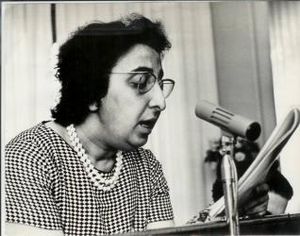Naziha al-Dulaimi facts for kids
Quick facts for kids
Naziha al-Dulaimi
|
|
|---|---|
 |
|
| Born | 1923 |
| Died | 9 October 2007 (aged 83–84) |
| Alma mater | University of Baghdad |
| Occupation | Activist, politician, author, and co-founder of the Iraqi Women League |
Naziha al-Dulaimi (1923 – 9 October 2007) was a very important leader in the Iraqi women's rights movement. She helped start the Iraqi Women League and was its first president. She was also the first woman minister in Iraq's modern history and the first woman cabinet minister in the entire Arab world.
Contents
Early Life and Education
Naziha al-Dulaimi was born in Baghdad, Iraq. Her family had moved there in the late 1800s.
She studied medicine at the Royal College of Medicine, which later became part of the University of Baghdad. She was one of only a few female students there. During her studies, she joined a group called the "Women's Society for Combating Fascism and Nazism." She was very active in this group. Later, the group changed its name to the "Association of Iraqi Women," and she became a leader on its main committee.
Career and Activism
Early Medical Work (1941—1948)
In 1941, Naziha al-Dulaimi became a medical doctor. She started working at the Royal Hospital in Baghdad and later moved to Karkh Hospital. During this time, she often faced problems from the government because she helped poor people. She would treat them for free at her clinic in the Shawakah area.
She then moved to Sulaimaniyah, where her clinic again became a place where poor patients could get free medical care. From Sulaimaniyah, she was moved to other cities like Kerbala and Umarah.
Fighting for Rights (1948—1958)
In 1948, she became a full member of the Iraqi Communist Party (ICP). This party was against the ruling king at the time. In January 1948, Dr. Naziha took part in a big public protest called "al-Wathbah." This protest was against a treaty that many Iraqis felt was unfair.
In 1952, she wrote a book called The Iraqi Woman. This book talked about women from farming families (al-fallahin) who had very few rights. It also discussed women from richer families who, even with more money, were still not treated as equals.
She tried to restart the Association of Iraqi Women with many other women activists. They asked the government for permission to create a "Women's Liberation Society," but they were told no. So, Dr. Naziha and other women decided to start the group secretly. They changed its name to the League for Defending Iraqi Woman's Rights. This group officially began on March 10, 1952. The League wanted to fight for Iraq's freedom, work for world peace, protect women's rights, and help Iraqi children.
Political Leadership (1958—1963)
After the 14 July Revolution in 1958, the League (now called the Iraqi Women's League) grew much larger under Dr. Naziha's leadership. It became a huge organization with 42,000 members. This was a lot of people, considering Iraq had about 8 million citizens at the time. The League helped women gain many new rights, especially through a new law called the Personal Status Law No. 188 in 1959.
Because of its important work, the Iraqi Women's League became a permanent member of the main committee of the International Women's Federation. Dr. Naziha was chosen to be part of this international group and later became its vice president. She became a well-known woman leader not just in Iraq, but also in the Arab world and globally.
In the 1950s, Dr. Naziha was also active in the Iraqi Peace Movement. She helped plan a peace conference in Baghdad in 1954 and was a member of the World Peace Council. She also spent time researching and working to get rid of a disease called Bejel in southern Iraq.
After the king was removed from power, President Abd al-Karim Qasim appointed her as the Minister of Municipalities in 1959. She was the only member of the ICP in his government. This made her the first female minister in Iraq's modern history and the first woman cabinet minister in the entire Arab world. Later, she also served as a State Minister in another government. During her time in government, Dr. al-Dulaimi played a key role in changing the poor areas of eastern Baghdad into a huge public housing project, which is now known as Sadr City. She also helped write the 1959 Civil Affairs Law, which improved marriage and inheritance laws for Iraqi women.
Life in Exile (1963—2002)
Because of her work with the Communist Party and her efforts for her country, Dr. Naziha was sometimes forced to leave Iraq and live in other countries. But this did not stop her from helping the Communist Party, the women's movement, and fighting for democratic rights. Dr. Naziha held a very important position in the party, becoming a member of its Central Committee.
She also played a big role in leading the Committee for the Defense of the Iraqi People. This group was formed after a coup in February 1963. The famous Iraqi poet Muhammad Mahdi Al-Jawahiri led this committee. In the 1990s, she continued her work with the women's movement, especially with the Iraqi Women's League. One of the last big events she was involved in was a meeting about the situation of Iraqi women, held in 1999 in Cologne, Germany.
Later Life and Passing
Naziha al-Dulaimi helped prepare for the 5th Congress of the Iraqi Women's League. However, before the meeting took place in March 2002, she had a stroke, which caused paralysis. She passed away on 9 October 2007 in Herdecke, Germany, at the age of 84, due to problems from her stroke.
See also
 In Spanish: Naziha al-Dulaimi para niños
In Spanish: Naziha al-Dulaimi para niños

